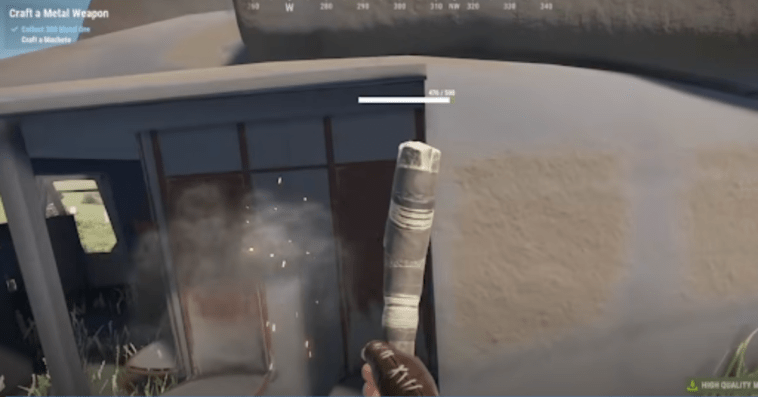Mastering Rust can be a game-changer for any player, new or experienced. As we navigate this harsh, multiplayer-only world, survival becomes our main focus. Rust is not forgiving; it tests our strategies and persistence at every turn. Success isn’t just about building the biggest base or having the most resources, but how efficiently and intelligently we manage what we have.
One of the biggest challenges in Rust is handling player encounters. Remember, you can’t always trust others. Sometimes, taking the offensive is the best form of defense. Rust is brutal, and sometimes eliminating threats before they become problems is necessary. It’s not just about surviving the environment but surviving others who share it with us.
Creating an airlock in our base design can be a lifesaver. An extra layer of protection means that even if someone breaks through one door, they won’t have immediate access to everything inside. This small addition can make a huge difference in keeping our resources safe from raids.
Starting Strategies for Survival
To survive in Rust, we need to make smart choices from the beginning. This means choosing a server wisely, setting up our base securely, and gathering resources efficiently.
Choosing the Right Server
Picking the right server is key to our success. We should consider both official and modded servers. Official servers offer a standard experience, while modded servers might have perks like increased gathering rates or custom rules. If we’re new, we should look for a server with a lower player population to avoid constant raids. For console players, there are servers specifically designed to give a smooth experience, so we should take advantage of those. Always check the server’s rules and wipe schedule to ensure it aligns with our playtime preferences.
Securing Your First Base
Our first objective is to find a safe location for our base. We should avoid highly populated areas and instead aim for a spot near resource nodes like wood and stone. Building a tool cupboard early helps secure our area from other players.
A simple 2×2 or 2×1 base with an airlock (two doors arranged to trap raiders) is a great start. Crafting a door with a lock is essential to keep unwanted visitors out. Don’t forget to place a sleeping bag inside, allowing us to respawn at our base. Always gather extra materials like wood and stone to repair or expand our base as needed.
Effective Resource Gathering
Having the right tools makes gathering resources efficient. Early on, we should craft a Stone Hatchet and a Stone Pickaxe to speed up gathering wood and stone. Look for nodes scattered around the map, as these contain valuable materials.
Crafting weapons like a spear or bow can also protect us during gathering trips. Sleeping bags should be placed strategically around our active areas to give us quick respawn options. Regularly collect and manage resources to ensure our base remains fortified and we have supplies for crafting and survival.
By following these strategies, we set ourselves up for a better chance of thriving in the challenging world of Rust.
Advanced Survival Skills
To thrive in Rust, we need to master various aspects of survival, especially combat and efficient resource gathering.
Mastering Combat and Raiding
Combat in Rust can be intense. PvP (Player versus Player) combat skills are crucial. Practice makes perfect. We need to train with different weapons to improve our accuracy. Understanding recoil patterns and bullet drop will help us aim better.
We should also use cover and high ground. Moving from one piece of cover to another minimizes exposure to enemy fire. High ground offers a better vantage point, making it easier to spot and shoot enemies.
When raiding, planning is key. We should scout the target’s base beforehand to identify weak points. Gathering sufficient resources, like explosives, and coordinating with teammates ensures a successful raid.
Monument Navigation and Loot Runs
Monuments are treasure troves in Rust. Knowing how to navigate them efficiently can be the difference between gearing up quickly or getting caught empty-handed. Map knowledge is our best friend here. Familiarize ourselves with the locations and layouts of different monuments.
Some monuments are radiation zones. We should always carry radiation protection gear and enough meds. Sticking to safe paths helps avoid unnecessary radiation damage.
Loot runs are most effective during off-peak hours when fewer players are around. This reduces the risk of ambushes. Fast looting and exiting the area quickly minimizes exposure to potential threats. Planning escape routes can save our lives in critical moments.
By mastering these advanced survival skills, we’ll significantly improve our gameplay experience and stand out in the harsh world of Rust. Additionally, you can further enhance your Rust gameplay with Battlelog’s sophisticated ESP hacking tools, providing an edge in navigating the challenging Rust environment.
Resource Management and Crafting
In Rust, effectively managing resources and crafting efficiently are key to survival and progress. Mastering these elements will keep us ahead of the competition and make our gameplay more enjoyable.
Maximizing Resource Use
Efficient resource management begins with gathering. We need to focus on collecting essential resources like wood, metal fragments, and components. It’s critical to use our inventory wisely to avoid carrying too much at once, which can slow us down.
Wood is crucial for building and crafting. We can gather it by chopping trees with tools like the hatchet or chainsaw.
Metal fragments come from smelting metal ore in a furnace. These are vital for crafting stronger tools and base upgrades.
We should also make use of every component we find. They can be dismantled for parts or used directly in crafting advanced items. Hunting animals will provide us with food, leather, and cloth, which are necessary for survival and making gear.
Crafting Essentials and Workbenches
To build even the most basic items, we need to understand the importance of workbenches. Workbenches come in three levels, each unlocking more advanced crafting recipes.
- Level 1 Workbench: Essential for beginner items like tools and basic weapons.
- Level 2 Workbench: Needed for more advanced items, including mid-tier weapons and gears.
- Level 3 Workbench: Used for the highest tier of equipment and most powerful weapons.
Investing Scrap in the Tech Tree while using a workbench will allow us to unlock new recipes without needing blueprints. Crafting stations like furnaces and workbenches should be placed strategically within our base for easy access.
Researching and Expanding Arsenal
Researching items allows us to craft them at any time, which is a huge advantage. Using the Research Table, we can break down found items into blueprints.
Here’s how we do it:
- Obtain an item we wish to research.
- Place it into the research table along with required scrap.
- Spend the scrap to receive a blueprint of the item.
Always prioritize researching tools, weapons, and essential equipment. Expanding our arsenal early in the wipe with a wide variety of gear ensures we’re prepared for different situations. Having a range of weapons and gear crafted can be a game-changer during raids or defense.
Remember, strategic resource management and crafting can significantly improve our chances of thriving in Rust. Keep refining these skills to stay ahead of the competition.
Community Interactions and Trust Building
Understanding how to interact with the Rust community can be the key to thriving in the game. Building trust while navigating the complex social dynamics of Rust is essential for survival and success.
Navigating Player Relationships
In Rust, the relationships we form with other players can make or break our experience. Trust is rare but valuable. One important strategy is joining a team. Working together provides safety in numbers and can make resource gathering and defense easier.
When playing on modded servers, it’s different from vanilla servers due to custom rules and dynamics. Here, forming alliances with dependable players can offer advantages. Being part of a community with shared interests or goals can also add a layer of protection against raiders.
Combat and raiding play large roles in community dynamics. Understanding how to raid effectively without always attacking everyone on sight can earn respect and foster alliances. On the flip side, constantly doorcamping reduces trust. It alienates you from others and makes you a target.
Lastly, places like the bandit camp are neutral grounds where trading can occur without conflict. Using these areas to recycle materials and trade goods helps build positive interactions with others. Remember, a reliable reputation can sometimes keep you safe more than heavy armor.








Comments